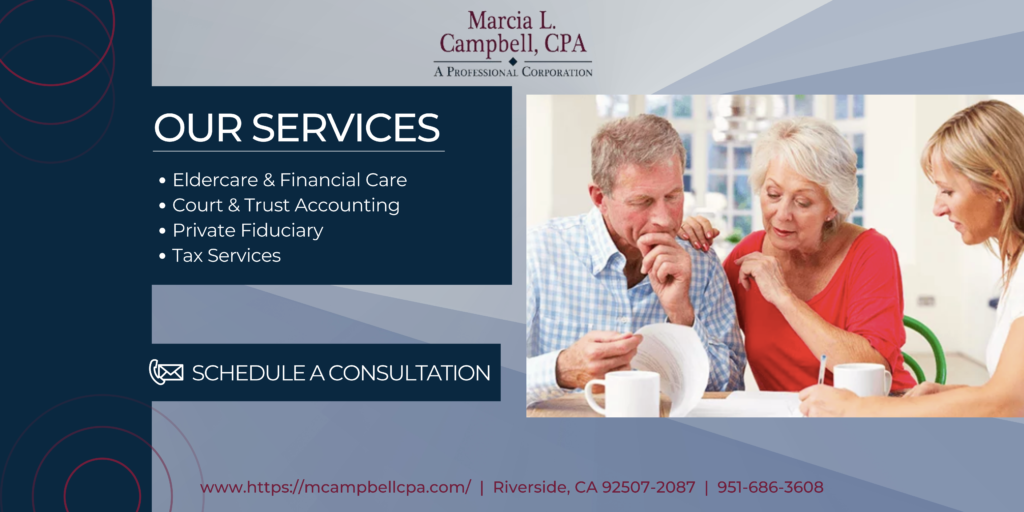
At Marcia L. Campbell CPA, we have spent years managing seniors’ assets and providing them and their loved ones something more valuable than money: peace of mind. Learn how to prepare in our blog.
How to Prepare for Taking Over Elderly Parents Finances
From starting the conversation to learning to recognize the signs, here’s how to prepare for taking control of elderly parents’ finances.
Start the Conversation Early
The first step when taking over elderly parents finances is having the conversation early. Even if your parents don’t need your help currently, start the conversation by talking about who will be in charge of their financial affairs if problems arise.
“Remember that it can take several attempts to get this conversation going and several conversations for your parents to accept help out of pride. Talking about money is hard, so don’t think you can have one simple conversation and make arrangements. You have to get a lot of information from them, so go into these conversations prepared.” – Marcia L. Campbell, CPA for Seniors
Designate someone to discuss their finances with doctors, financial representatives, and attorneys, and make sure that you are having an ongoing dialogue with them and keep them in the loop. Transparency is key when managing elderly parents’ finances.
These conversations will help you understand their financial situation and what your involvement will look like over time. Ask them:
- What are your monthly expenses?
- What are your spending habits like?
- How do you pay your bills now?
- How much is your yearly income, and where does it come from?
- Do you receive Medicare, Medicaid, or Social Security benefits?
- Do you have an accountant, financial planner, or attorney?
Related Article: How Do You Talk to an Aging Parent About Finances? Pt. I
Make Gradual Changes
Preparing to take over elderly parents’ finances also requires some baby steps and sensitivity. Instead of rushing in to take charge of their finances, increase the support you give them gradually when needed.
For example, if you want to take over writing checks or paying bills for them, start by doing it together. Making gradual changes will help your parents get more comfortable with getting the help they need.
Take Inventory of Financial and Legal Documents
Next, take an inventory of important documents and information. Compile a list of their contacts, account numbers, and where they store legal documents like birth certificates, insurance policies, passports, deeds, and wills.
Also, ask about passwords for all accounts and digital assets, and document them in a secure place that’s still easy to access. Ensure everything is up to date and valid, all accounts are in good standing, and all sensitive information is securely stored.
Simplify Bills and Take Over Financial Tasks
Once you organize everything, take a closer look at any income your parents might have, like retirement or savings, and switch them to direct deposit if possible. By doing so, you ensure your parents’ money makes it into their accounts.
You can also set up online bill pay for bills. But for more hands-on help to avoid problems, working with professionals like daily money managers for seniors can be a huge help.
Related Article: Elder Care Financial Services: The Benefits of Daily Money Management
Consider a Power of Attorney
A financial power of attorney is a legal document that gives someone else the power to make decisions on their behalf. Getting a financial power of attorney and designating a professional fiduciary to oversee one bank account can be a great option, too.
A CPA fiduciary will oversee this account and manage income, expenses, and bill payments, which also safeguards your parents against scams. If they lose competency without a financial POA in place, you’ll likely have to file a petition for a conservatorship.
Separate Finances
Don’t mix your finances with your parents, even if it seems like a quick, convenient fix. Using your own money to help them can lead to larger problems. Separating your finances is key to preparing for taking over elderly parents’ finances.
No matter the circumstances, always keep your assets and finances separate, and don’t put your retirement or savings goals in jeopardy to help your parents.
Know the Signs
You also need to learn the signs to understand when taking control of elderly parents’ finances is necessary. Stay vigilant for signs, and consider this something you should do alongside the conversations you have with them.
Signs your parents might be struggling to manage their finances include:
- Bounced checks
- Unusual purchases
- Piles of unopened mail
- Always complaining about money
- Physical setbacks
- Difficulty writing checks
- Memory problems
- Falling victim to scams
- Voicemails from creditors
- Suspicious new “friends” asking for favors or loans
Trustee services in California can lift a huge weight off your shoulders and significantly help prepare and manage your parent’s finances.
Related Article: How Do You Know if Your Parents Are Struggling with Money? Pt. I
Do You Need Help Taking Over Elderly Parents’ Finances? Find a Professional Fiduciary CPA today!
Are you worried about your parents managing their finances today, tomorrow, or years down the line? Preparing for and taking over elderly parents’ finances is a time and labor-intensive undertaking that can feel like a full-time job. But we can help.
Visit our Contact Page and schedule a consultation to enlist private fiduciary services to give you and your parents peace of mind!


